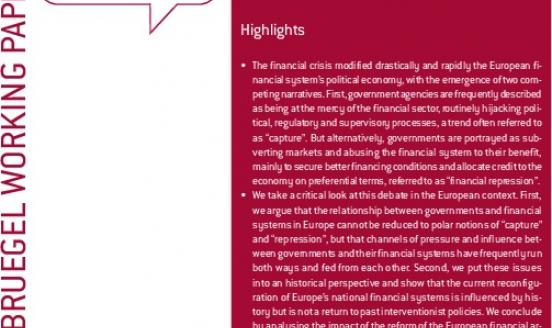The Weekender
Dear All,
It has been an eventful last few days for the Spring Meetings of the IMF and the occasion of a series of speeches, conferences and corridor discussions which I have only followed from the distance and via proxies.
Despite, the disappointment on the European firewall (or the lack thereof), the IMF unleashed some 430bn dollars of additional resources but the focus has turned on the necessity to tackle convincingly the banking sector (and therefore Spain).
I will only focus on:
European banking resolution: What we have and what we need?
After fiscal consolidation, the consensus seems to be that financial stability is the biggest downside risk to the economy and that the credit multiplier is key to the recovery and that this will only come through a stable banking system. In this context, policy efforts should intensify to quell the European banking crisis.
I have already discussed this to some degree last week where I was complaining that the ECB was wrongly channeling its pressure on governments towards fiscal consolidation and not towards banking sector restructuring. I’m happy to being proven wrong this week by at least three ECB speeches, one by Benoit Coeure on risk sharing where he repeated his call for banking sector resolution and restructuring authority, one by Constancio at the Banque de France’s Stability Review presentation in DC, one by Jorg Asmussen who also essentially called for a European FDIC.
These three speeches are very encouraging and contrast with the previous discretion of the ECB on these matters. The fact that they are also apparently coordinated means that they are more than personal reflections (Benoit Coeure had already mentioned these ideas before) but are now more broadly shared and advocated by the Executive Board.
What is somewhat disappointing still is that these speeches outline what looks like a long-term objective but do not translate into actionable policy responses in the short term. In particular, it is not very clear how one reconciles those lofty ideas about decentralized risk sharing in the euro area with the urgency of the Spanish situation.
Here I think one needs to appreciate that we do not really need new institutions in the short-term and that the embryonic structure of the future banking resolution and restructuring mechanism is the EFSF (and ESM to be). The EFSF does not have the real political mandate and technical ability but it can create the former and buy the latter.
Indeed, the EFSF was given last summer the ability to be used for the purpose of banking sector recapitalization. It can therefore totally act as the agent for a profound restructuring of the banking sector any given program country. In its current setting, it would have to lend onto the governments but could structure the loan such that its terms mimic an indirect equity participation in the banking sector. More importantly, beyond the financial aspects, the “Troika” would have to design a banking restructuring plan to which national authorities would have to adhere.
This is where the challenge starts because nobody in the “troika” has this sort of expertise. The first type of expertise needed is a detailed analysis/valuation of each and every asset in all banks’ balance sheets. This is tedious work but Blackrock and other firms seem to have developed (in Greece and elsewhere) the technology to do this fairly effectively and this expertise can therefore be subcontracted.
But once this is done, important political decisions need to be taken about the banks that will be let go, the ways to recapitalize them and the amount of public resources that should be dedicated to this effort. These decisions are likely to be inadequate, if they are taken by national authorities alone, and they are likely to ignore important national idiosyncrasies if they are completely imposed by the troika.
This trade-off can only be resolved by a body with more executive authority and legitimacy than the EFSF currently enjoys (the ESM will have more authority in this respect, especially if it is chaired by the chairman of the eurogroup). The question is whether the ECB could be this agent until a new body/institution is created?
Finally, the ECB remains extremely silent on deposit guarantee schemes (ironically forgetting that this is the primary function of the FDIC to which all of these speeches make direct or indirect reference!). Even though, the ECB has understandable difficulties in talking openly about deposit guarantees (risks of self-fulfilling runs), organizing a supranational backstop of deposits is an important preemptive tool and would go along the lines of clarifying fiscal and monetary responsibilities in the risk sharing.
In fact, it might be a necessary precondition because in a number of instances, if bank creditors are to make a loss in the restructuring, they might spark runs across all categories of creditors in the capital structure. For instance, depositors in Spain who have invested in hybrid quasi-equity structures in Cajas where they keep their deposits will be more likely to move their deposits abroad if they are to make a loss on their equity investment. These cross-correlations can be addressed only with an effective and credible deposit guarantee scheme.
All in all, we are slowly moving in the right direction (Banking union) but:
- We need to start thinking more seriously about supranational guarantee schemes. An EFSF backstop of national schemes could do but ideally a real supranational backstop of all deposits along equal terms would be better. Having this in place, would greatly simplify restructuring/resolution. One should think of it as anaesthesia before surgery.
- We do not need a new FDIC type of institution now but need a transitory one. The EFSF and the ECB could be temporary fixes to on one hand finance and take responsibility for and on the other hand outline and implement a restructuring/resolution plan.
- We need to think about better institutions for the future but cannot afford to wait to have these institutions before we act in Spain.
Finally, I can’t conclude without a couple of words on the French election where political analysts seem to consider that Hollande’s victory is now within reach. I’m a bit more doubtful and think that the polls are showing an excessive advance for Hollande in the second round and that Sarkozy will be a much tougher opponent. But regardless of the final result, I think the most important outcome of this first round is the very strong showing of the far right (around 19%). The Front National is likely to take a place in the French political landscape that it never had since WWII. This is a bad moment for Europe and is likely to be echoed across the continent. Watch how the early elections in the Netherlands are going to unfold for more on this…
Happy to have your thoughts as usual,
Best Regards,


